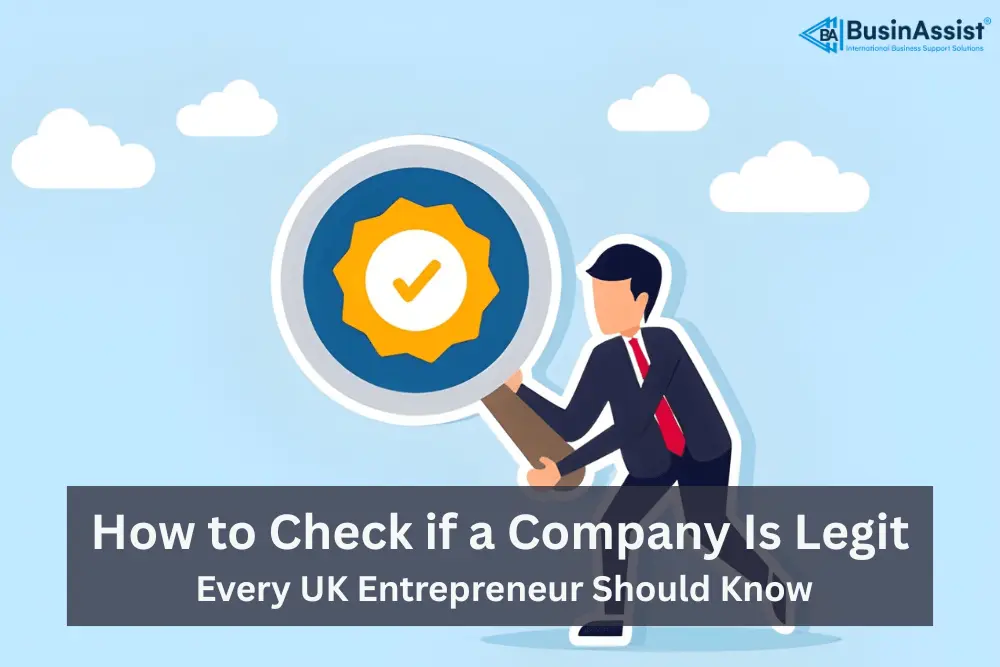Last Updated on December 22, 2025 by Joy Kyalo

Partnership is crucial when combining resources, skills, and knowledge to reach a specific goal. However, before signing or entering into an agreement with any company, it is important to verify if the company is legitimate.
No business wants to engage in a partnership or transaction with a company involved in fraudulent activities. All companies registered in the UK must follow the Anti-Money Laundering (AML) regulations; however, some company officers are involved in questionable activities.
But how can you determine if a company is legitimate? This article will cover everything you need to know about how to verify a company’s legitimacy.
Key Takeaways
- Always check a company’s details on the Companies House register to confirm its legal status, directors, and registration information.
- Use reliable tools like the HMRC VAT checker or credit reporting agencies to verify the company’s financial health and tax compliance.
- Check the company’s online presence, reviews, and contact details to ensure authenticity and avoid dealing with fraudulent businesses.
Why do you need to verify if a company is legit?

Whether you need to collaborate with another business or enter into a contract, it is essential to verify if a company is legitimate. The reasons why you need to verify if a company is legit include;
Know if the company is legally established:
Doing a company search will help you know if the company is legally registered in the UK. All registered companies are publicly listed on the Companies House register, including the year of incorporation, directors, UK registered office address, company status, nature of business, accounts, company type, and confirmation statements.
Check if it is in good financial health:
Nobody wants to do any business with a company that is in bad financial health. Research is essential for understanding the financial stability, growth potential, and risk profile of target companies. Health checks help these firms identify the best opportunities, mitigate investment risks, and develop strategies to maximise returns on their investments.
Pro Tip: Always Verify Before You Partner
Before signing any deal, always take five minutes to check the company on the Companies House register. A quick search can reveal red flags like dissolved status, late filings, or fake directors – saving you from major financial and reputational damage later.
Build trust:
Businesses need to build trust to foster loyalty, build a stronger reputation, to build collaborations and strong partnerships. Trusted companies perform better in crises, showing a significant return on market value, enhancing the chances of getting into a partnership with them.
Avoid damage reputation:
Falling for a fake company doesn’t just mean losing money; it can also damage your reputation and lead to legal trouble. But when you know how to check if a business is legit, you will be able to avoid these risks.
Spending time to check if a company is legit saves you from a lot of risks, such as relying on your company data on the wrong entity. Scams are everywhere, and their impact is huge, from losing money to legal troubles.
How to check if a company is legit

Companies House public register
Companies incorporated in the UK have their information on the public register. The easiest and quickest way to get information about a company is to research on the Companies House website.
To research the company you are interested in, enter the company’s name or number (if you have it) in the search bar, and you will be able to find it if registered. You will be able to find information such as the filing history, its address, and the company directors, among others.
If no result of the company comes up, then the company is not registered. However, if the company name has a business structure such as ‘Limited’, ‘Ltd’, or ‘LLP’ and is not on the Companies House search should raise questions about its legitimacy.
Sole traders and general partnerships do not need to register the business with Companies House. However, they must register with HMRC for tax purposes. The business name should not include a company structure since they do not operate under any.
Pro Tip: Use Multiple Sources to Verify a Company’s Legitimacy
Always cross-check company details on Companies House, HMRC VAT Checker, and review sites. Genuine businesses have consistent contact info and verified records. A quick check can save you from scams and bad partnerships.
Use HMRC VAT checker
Since not all businesses must register with Companies House, you can do an HMRC VAT check to ensure that the business is registered for taxes and its status. Businesses, registered and non-registered, must register for a Value Added Tax (VAT) number if their annual taxable income exceeds £90,000.
The HMRC VAT checker is a free tool, meaning anyone can use it to search the tax status of any business. Enter the company’s VAT number in the search bar, in the format GB098765432, and the business name will appear with a record of its tax status.
The search will help you know if the;
- VAT number matches the business details provided
- If the business adding VAT to invoices appears on the register
- The company is legitimate and authorised to conduct business
- Prevent financial penalties and fraudulent activities
Use credit reporting services
To check the financial status of a company and its credit score, there are credit reporting services that can be used to conduct research. Reporting agencies in the UK include: Experian, Equifax, and TransUnion.
These are the main credit reference agencies (CRAs) that are used to check individuals’ or businesses’ financial history. These agencies will be able to show the company director’s details, credit score, payment history, and insolvency warnings.
To get into a contract or partnership with a company involved in financial services, you can verify their credentials – check the Financial Conduct Authority (FCA) register. This database contains information about every financial company registered and regulated by the FCA. You can search for a company by entering its name and/or postcode.
Online presence authenticity
Most businesses have been reported to use the online platform to scam other businesses and people. Most of these fraudulent businesses may not be registered with Companies House, but operate as sole traders, and the best way to verify their online presence is by doing due diligence research.
To verify the authenticity of the business’s online presence, you can verify their;
- Contact information
- Physical address
- Online history
- Customer reviews
- Social media activities
You can look for red flags as sketchy information on their website, recent domain registration, and a lack of transparency. Some tools can be used to validate the business, such as the Google Transparency Report and the Better Business Bureau (BBB).
Conclusion:
To conclude, before getting into any partnership or collaboration with any business, it is essential to check its legitimacy. The above-mentioned are how to check if a company is legit to avoid several risks that can endanger your business.
Legitimate companies are transparent about all the information they provide to the public and accountable for their own actions and impacts, which include financial performance, legal compliance, and environmental responsibility.
Additionally, UK company formation agents also help in checking for legitimate companies by handling the official registration process with Companies House. Any company registered by BusinAssist undergoes specific checks and a verification process before it is approved by Companies House. As an Authorised Corporate Service Provider (ACSP) and accredited by Companies House, BusinAssist ensures that it conducts identity verification and KYC to verify that the company officers are legitimate.
To find out more, contact us at info@businassist.com.
FAQs
Q: What official records can I check to verify if a UK company is legitimate?
Ans: Official records to check if a company is legitimate include: registration with Companies House, directors’ information, filing history, tax status, physical address, and financial health. While not all businesses are registered with Companies House, sole traders can be verified through a VAT registration with HMRC.
Q: How can I check if a company is registered with Companies House?
Ans: To check if a company is registered with Companies House, you can check its database. By doing a company search with its legal name or the incorporation number (if you know it), the database will highlight the search results if the company is registered.
Q: How do I know if a company is compliant with HMRC rules?
Ans: You can check if a company is compliant with HMRC rules by checking its tax status. Since the VAT number of any business is accessible in invoices or receipts, you can use it to search the status of the tax company. The HMRC VAT checker tool is free, meaning anyone can do a search to check tax status.
Q: Should I trust online reviews and social media when checking a company’s legitimacy?
Ans: If a company has a legitimate website and has been in operation for a long time, there should be authentic reviews from previous customers. It is easy to differentiate between authentic and fake customer reviews.
Q: Can a virtual address affect a company’s legitimacy?
Ans: Not really, The legitimacy will depend on which UK virtual address the company is using. A poorly chosen virtual address will affect the legitimacy of your company. Choosing the right virtual office address in UK that aligns with the Companies Act 2006 regulations on the registered office address.
Q: How long does it usually take to verify a company’s legitimacy in the UK?
Ans: It only takes minutes to verify if a company is legit or not since the information is publicly available and free.
Read Also:
- 50 Small Business Ideas to Start in 2026: Low Investment and High Potential
- How Many Bank Holidays in 2026? Full List of UK Dates You Should Know
- Understanding Your Rights: What to Do If Your Employer Doesn’t Issue a P45
- What is a Tax Office Reference Number and How Can I Find It?
- Why would a Company Register a Charge with Companies House?
- A Complete Guide to Companies House Director Identity Verification
- Someone Has Registered a Company at My Address in the UK – Understanding Your Rights
- How to Trademark a Business Name in the UK: What Every Entrepreneur Should Know
- TM01 Form: Removing a Director – Everything You Need to Know
- What Is a Minute Book? Key Corporate Recordkeeping Explained

Joy is a content writer at BusinAssist with 6+ years of experience in content marketing and social media strategy. She specialises in company formation and virtual operations, guiding entrepreneurs through global markets with clarity, drawing on her marketing and PR background. Business Assist with BusinAssist – your business success partner.